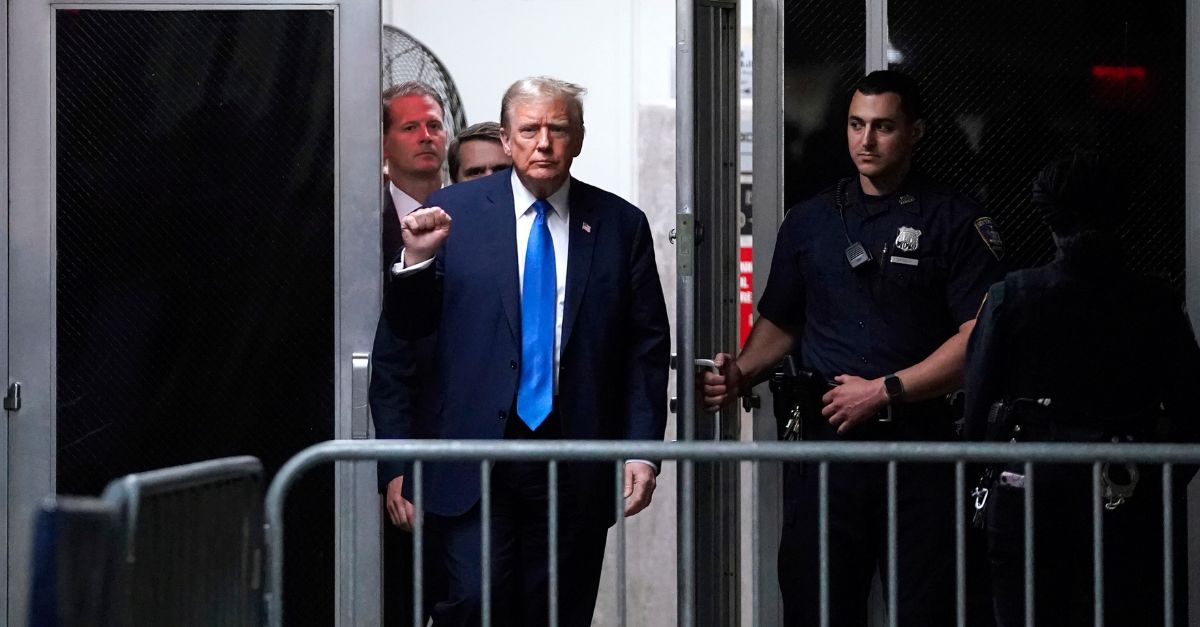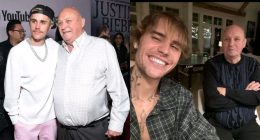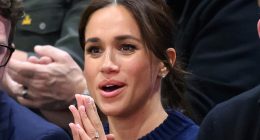
Former President Donald Trump gestures in the hallway outside the courtroom as he returns from a recess at Manhattan criminal court in New York, Thursday, April 18, 2024. (Timothy A. Clary/Pool Photo via AP)
On Friday, after a full jury was seated in Donald Trump‘s criminal hush-money and election interference trial in New York, a hearing was held to air out the former president’s bad acts, giving him an idea of the sort of questioning he could face should he opt to testify.
The process is known as a Sandoval hearing. As Law&Crime previously reported, Manhattan District Attorney Alvin Bragg‘s office filed a notice with the court on Wednesday requesting its desired parameters for the hearing aimed at undermining Trumps’ credibility before the jury.
The idea behind the hearing was succinctly explained by former federal prosecutor Joyce Vance in analysis Friday:
Prosecutors can’t offer evidence of prior crimes and bad acts to show a defendant is of bad character or that because he’s done wrong in the past he must be guilty in the instant case.
If they want to use evidence like this in their case, it has to be relevant to one of the issues. But they can use this evidence to impeach the credibility of the defendant as a witness if he testifies.
Prosecutors have indicated that they are going to ask Trump questions about a limited number of Trump’s more recent legal defeats, namely, veteran columnist E. Jean Carroll defamation lawsuit as well as New York Attorney General Letitia James‘ civil fraud trial. The ruling from Trump v. Clinton was proposed too, with prosecutors pointing out how the court sanctioned Trump and ordered he pay $937,989 in fees for filing a “frivolous, bad faith lawsuit.”
With the Sandoval hearing, Trump will have an idea of what he will be up against should he testify, a point from which there is no return for a criminal defendant — for better or worse.
The former president has pleaded not guilty to all charges he faces and is appealing both his judgment in the civil fraud case as well as the Carroll defamation case. Historically, Trump has said that he would testify — and he may. He briefly did so in his defamation trial but it was short-lived and contentious.
According to Lawfare, Trump attorney Emil Bove wanted to keep discussion of the civil fraud trial out because if it should come up when the former president is on the stand, discussion of it may confuse jurors. He also argued procedural issues somewhat unpersuasively, contending that because an appellate court had stayed relief in part, Bragg should be precluded from crossing him on any findings in that case.
But prosecutor Matthew Colangelo was insistent: Trump lied on the stand in the civil fraud case and that fact should be one of the facts the jury in the hush-money and criminal election interference case should consider, too.
During the civil trial, after Trump violated Engoron’s gag order, the judge put Trump on the stand and the court found that he lied, says Colangelo. Its “hard to think of something more probative than” lying under oath “in a courthouse 200 yds from here—if not closer—6 mths ago.”
— Tyler McBrien (@TylerMcBrien) April 19, 2024
Additionally, evidence from the Carroll defamation trial was “too attenuated,” according to Bove, and too long ago to use to against Trump now.
“Are they making arguments about sexual misconduct?” Lawfare reported Bove remarking in court late Friday afternoon. “This case is about documents.”
As to the Trump v. Clinton evidence, Trump’s defense team told Merchan that the ruling in that case was “disputed,” drawing the judge to question exactly what Bove meant multiple times. The attorney clarified that it was under appeal. Appearing inclined to side with the prosecution, Merchan cited a line from the Trump v. Clinton ruling back to the former president’s defense team:
“‘Here we are confronted with a lawsuit that should never been filed,”” Merchan said, continuing citations from ruling which called it “frivolous” and “in bad faith.”
“If that’s not Sandoval I don’t know what is,” the judge said.
In another case prosecutors seek to draw from, People v. Trump Corporation, Bove argued to the judge that the government itself had clarified that the charges were not about Trump the man but Trump companies.
For that very reason, Colangelo retorted, the evidence should be admitted. Corporate criminal convictions where the very defendant in question at one time had control over those properties is relevant. In that same vein, the prosecutors said that evidence from James v. Trump Foundation should come in because Trump was in charge when a number of fiduciary obligations were breached.
A decision on the evidence will be made by Monday, per the judge.
At its core, Trump’s indictment in New York alleges that he falsified records in order to shroud a $130,000 payment he made to his onetime attorney and fixer Michael Cohen reimbursing him for the money he gave to adult film actress Stormy Daniels in 2016. The payment, Bragg contends, was veiled so Trump wouldn’t hurt his efforts in the presidential election that year. According to the indictment, Trump was also at the center of a scheme with American Media Inc., the publisher of the National Enquirer.
Bragg alleges the media group paid Playboy model Karen McDougal $150,000 in exchange for her story about an agreement she made not to speak publicly about a sexual relationship she had with Trump.
Have a tip we should know? [email protected]




